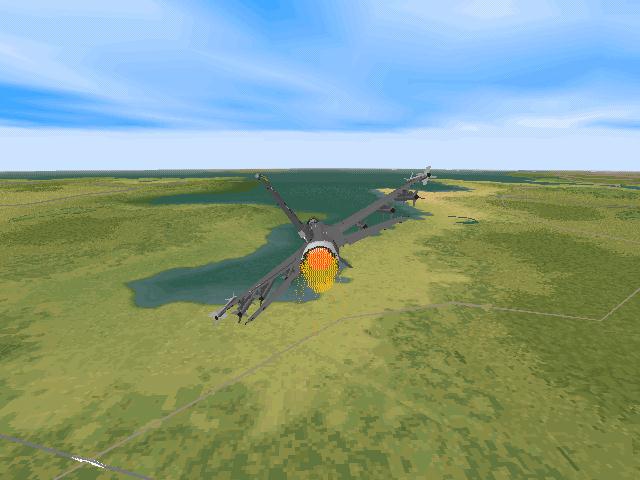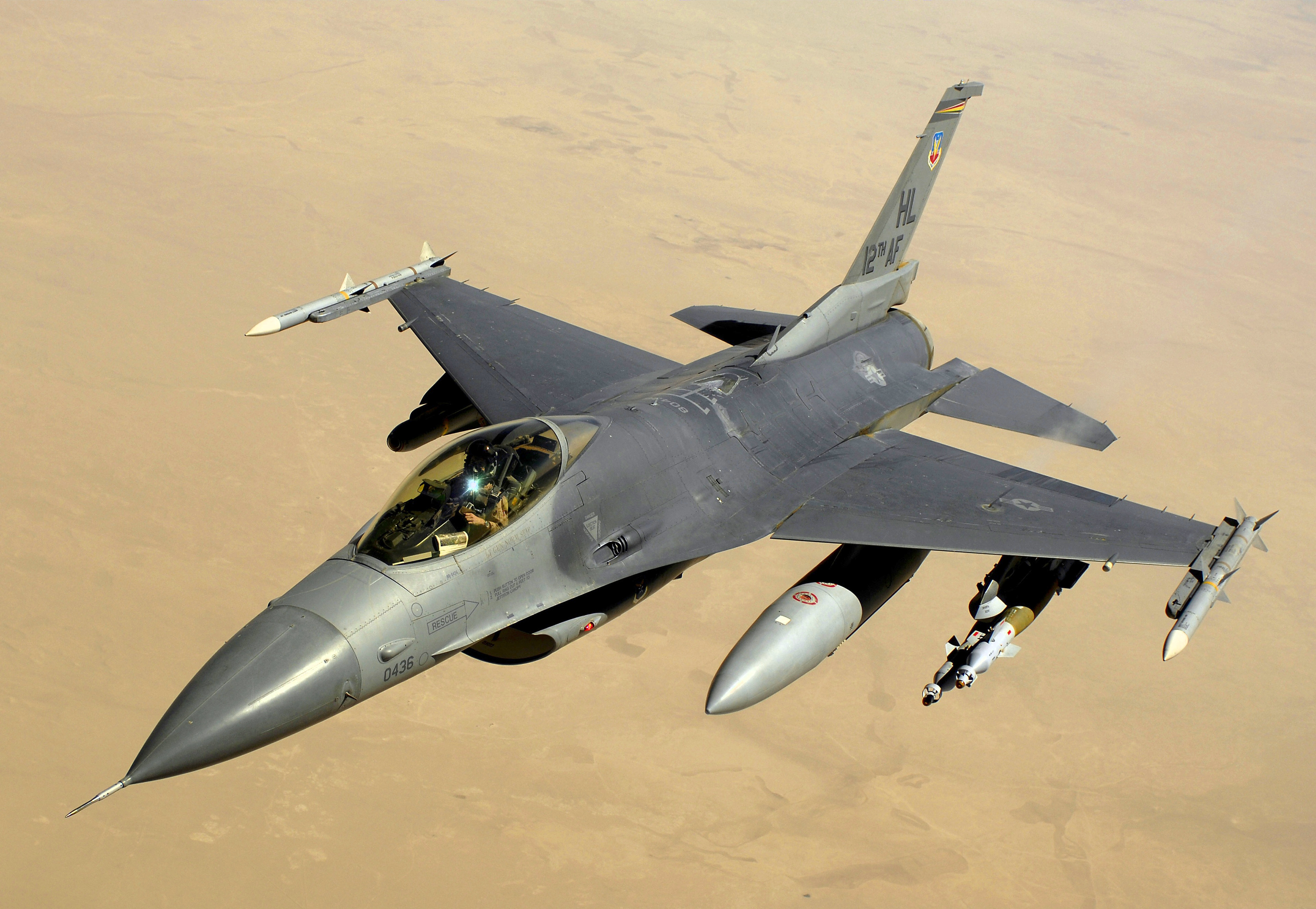An American multi-role supersonic jet fighter first introduced in 1978.
Overview F-16 Fighting Falcon (known as F-16 Fighter in territories other than the US and Japan) is a jet simulator originally developed by Nexa for the Japan-only MSX home computer in 1984, later ported to the Sega Mark III/Sega Master System by Sega. Despite the port being several years more recent and for much more powerful hardware, the game remains unchanged, making it one of the less visually impressive games for the system.
It was, however, the first game for the system that was originally developed by a company other than Sega themselves. Gameplay F-16 Fighting Falcon is viewed from a first-person cockpit view, with the surrounding space mapped out via a system of grids to evoke that of the F-16's targeting computer, complete with an altimeter and speedometer and other feedback gauges. The goal is to shoot down enemy jets using a combination of the F-16's 20mm machine gun and missiles. Players need to move the targeting cross-hair over each enemy jet and shoot them down to progress. Curiously, presumably because the MSX had far more buttons to work with, the game requires a second controller: One controller's D-pad controls the direction the jet flies in while the other increases and decreases velocity. As such, the most challenging aspect of the game is mastering the odd controls.
Because Interactive Magic's iF-16 was released after iF-22, you may be expecting the same graphics engine, right? IF-16 does not run on the same flight engine as Interactive Magic's iF-22. Rather it uses the same aging engine that powered HIND and Apache. This is because of the fact that HIND, Apache, and now iF-16 were developed by Digital Integration while iF-22 was developed by Interactive Magic. Gameplay and Documentation iF-16 begins with a set of 20 detailed non-mandatory training missions that directly accentuate a 69-page tutorial manual that is separate from the 116-page game manual. The training manual takes you step by step through each faucet of the simulation, from takeoff-landing to each delivery system for each particular weapon.

For example, when dropping unguided air-to-ground bombs, you can practice a manual (dive bomb) release, straight line (laydown) approach, or a loft bombing approach. The latter two are computer-assisted releases. The training manual takes you through each option. For those who are new to military flight sims, the training missions are very detailed and informative and are an invaluable teaching tool. From the training menu, you can choose any system you think you may need to work on.
Unfortunately, for each training mission, you must take off, fly about 4-5 waypoints until you reach the training targets, then fly back the way you came and land. Very realistic, but awfully annoying to spend 15 minutes getting to and from your training targets. When you feel you have had enough training, you can go out into the REAL world and fly some serious missions. You have a choice to fly in Israel, Korea, or Cyprus. It seems strange that there is no Iraq campaign, since there is a lot of reference to the F-16's performance in Desert Storm on the outside of the box.
For each location you have a choice of flying a complete campaign or choosing one of 10 single missions. In the campaigns, you fly a short 10-12 missions consisting of both air or ground objectives. Each mission begins with a narrated campaign situation briefing followed by a narrated mission briefing. The player is then presented with a mission map showing the default waypoints. Your weapons loadout can be edited as can your waypoint locations. Sadly, there is no mission creator, so once you have gone through all three of the short campaigns and played all 30 of the single missions (10 in each theater), you may as well retire.
The biggest drawback of the iF-16 campaigns is that you can't back up your pilot or your place in the campaign. Of course this is another realistic yet annoying feature you cannot have. Once you have died or failed three times, you must start the campaign over from the beginning. As a flight sim player, if I didn't want the ability to replay a failed mission I would have joined the Air Force!! One nice feature is how your plane takes damage.

When damage occurs, various subsystems can be damaged that directly affect you: HUD display, various radar systems, cockpit pressurization, engine, brakes and landing gear, just to name a few of the 24 different subsystems that can break down because of a few bullet holes in your airframe. One time I damaged my landing gear and had to attempt a belly landing on the runway. Expecting my fighter to explode the second it contacted the runway surface, I was pleasantly surprised to find out belly landings were possible.
The obligatory quick start option is available for those who just can't wait to be magically inserted at 10,000 feet, looking up the tailpipe of a MIG. Quick start also offers a high score table for keeping track of your kills. Friendly and Enemy AI It is 06:00. You and your wingman are sitting on the tarmac and have just been cleared for takeoff. You both punch the afterburners and takeoff fully loaded on a mission to take out some enemy armor. Right after takeoff, your wingman says, 'Let's go kick some butt!' And VAROOM!, your wingman swings around and accelerates faster than the space shuttle until he is well out of sight.
That will be the last you see of your wingman until the next mission. Dcs a 10. There are wingman commands that exist; however, if you don't use them, your wingman will not go after the mission objectives. He will just fly around the waypoints, possibly engaging a MIG from time to time.
I was way too busy trying to take care of my own aircraft and weapons to waste time instructing my wingman which targets had to be attacked. The enemy AI at least has a wide range of difficulty settings. You can adjust these settings on a 1-10 scale to your liking. The easiest setting is like Barney the Dinosaur flying against you, and the hardest is relevant to Quake's Nightmare level in terms of improbable odds. The AI didn't really display any talented individual flying from my experience. Graphics This is where iF-16 struggles.
Compared to other military combat sims, the graphics are mediocre at best. Strangely, my 200MMX struggles to put out some decent frame rates with all the textures enabled. The terrain mountains are mostly pyramid-shaped, regardless of the part of the globe where your missions take place. Whether you meet up with the wrong end of a surface-to-air missile or you scrape the paint off your wingman's F-16 while taxiing on the runway, you will get the same pixelated explosion. I flew behind an enemy 707 at 40,000 feet and fired 3 bullets into its rear, and BOOM!! That same old ugly explosion again. It's not all bad; the exterior of the F-16 and cockpit look great and highly detailed.
I flew a night mission over a heavily-defended target that brought back memories of the CNN videos of Baghdad's air defenses during Desert Storm. Unfortunately, there is no way to save or replay any of your missions. Audio During a mission there is always a lot of radio chatter, but very little has to do with you. One problem is the fact that all the allied planes in the air all have the same voice, including your wingman! If you hear 'I'm bailing out!'
Or 'Help me out here!' , you have no idea if it is your wingman who is in trouble or his location. The sound preferences screen allows you to switch off the radio chatter during your missions altogether.
There are the usual engine and weapons sounds, but nothing will blow you away. Controls As with all flight sims, there are always a ton of keyboard commands to memorize and iF-16 is no different. IF-16 comes with a handy double-sided quick reference card, which is an invaluable tool until you memorize the keyboard commands. My Thrustmaster FCS had no problem staying centered.

The POV Hat switch controls your view direction while the extra buttons help you cycle through targets and radar modes. Multiplayer Support iF-16 offers the gamer the ability to play two-player games or up to 16 players over an IPX network. The two-player games consist of 'Combat' or 'Single Missions.'
Combat is a simple head-to-head duel taking place in Korea. Single Missions allow you to fly actual missions with your connected partner as your wingman. Two-player games can be connected via modem, direct cable link, or over a network. Each player will need their own copy of iF-16 to pull this off.
Network play allows you to choose two scenarios: Deathmatch or Capture the Flag. In Deathmatch, your purpose is to be the last plane flying or you can duel in teams. The goal in Capture the Flag is for your team to destroy the enemy's headquarters. At this time, iF-16 has no Internet support.
Bottom Line Despite the numerous graphical and interface problems previously mentioned, iF-16 has a good flight model with a very realistic feel to it. Some of the best flight sims started out good and then became great after the needed patches were released (Falcon 3.0). I believe iF-16 is starting out average but could become good with the appropriate fixes to some problems. Interactive Magic has an opportunity to make this a good flight sim.
F-16 Fighting Falcon Game Download
IF-16 doesn't offer many of the new features that we have come to expect in today's flight sims such as satellite terrain mapping, 3D video support and Internet play.